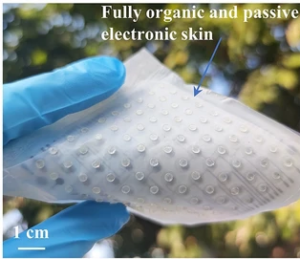Organic Sensors Bring Skin-Like Sensitivity!
The key findings from this research are the development of fully organic, passive tactile sensors inspired by human sensory cells. These sensors use a unique reversible polarization of conjugated polymers, enabling high sensitivity and low power consumption. Here’s a summary with a focus on the benefits and applications of this innovation:
This bio-inspired sensor mimics human skin’s ability to sense pressure and texture, enabling both static and dynamic stimuli detection. Traditional sensors need continuous power and respond only to movement, while this innovation operates on minimal power without an external supply. Using materials like PEDOT:PSS, polyaniline, and polypyrrole, researchers have created sensors that detect subtle changes in texture, material properties, and shapes with the help of machine learning.
The new design includes micro-structured ionic electrolytes between polarized electrodes, allowing precise touch responses. The sensors can process inputs independently, reducing interference and improving reliability. Notably, they sustain 5000 usage cycles and adapt to varied pressures, from soft textures to firm materials.
The sensors are fully biodegradable, made from organic materials like PVA and PLA, ensuring environmental safety and compatibility with human cells. They demonstrated 99% accuracy in distinguishing material properties and high reliability for healthcare applications, such as detecting heartbeats when placed on prosthetic devices.
This advance points towards revolutionary applications in robotics, smart prosthetics, and touch-sensitive devices. Read more on this here.





